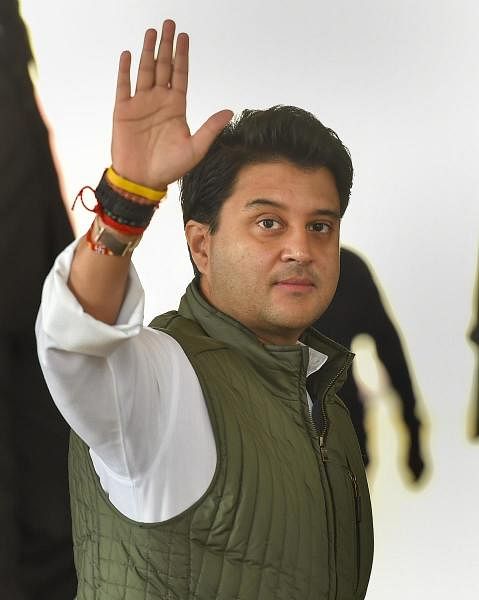
Jyotiraditya Scindia’s departure from the Congress and entry into the Bharatiya Janata Party (BJP) might not open the floodgates for more such exits, but the episode has suddenly given a voice to Scindia’s former peers from the Congress to draw the Gandhis’ attention to their own plight and that of the Congress in general.
Kuldeep Bishnoi, the son and political heir of the late Bhajan Lal, who is a legislator from Haryana’s Adampur, called Scindia’s resignation a "big blow to the Congress" and cautioned that India’s oldest party "needs to empower young leaders who have the capacity to work hard and resonate with the masses." It's debatable how many of the "young leaders", who carry themselves with a sense of entitlement because most of them come from politically-pedigreed clans, tick the boxes that Bishnoi listed. However, in a fundamental sense, his entreaty was directed at the Congress' seniors who resolutely stood their ground and kept their commanding positions just when the party seemed poised for a demographic churn under Rahul Gandhi’s leadership.
Bishnoi's is not a lone voice. Pradyot Manikya Debbarma, who had quit as the Tripura Congress president in September 2019, reported in a Facebook post that he spoke to Scindia and was told that the latter was not granted an appointment by Rahul despite several requests. Scindia was an integral part of Rahul’s team—or at least that was the perception—through the 10 years that the Congress-helmed United Progressive Alliance (UPA) ruled India. It was a political and social equation since the two were spotted at coffee bars in Lutyen’s Delhi. Debbarma’s parting comment was that the Grand Old Party had "simply" become an Old Party, itself a reflection of the younger generation’s impatience and restlessness with the Old Guard who are loyalists of the interim Congress president Sonia Gandhi and her predecessors.
The reactions from the brass ruling Rajasthan typified the generational gap. Sachin Pilot, a Rahul contemporary and the Deputy Chief Minister, said he hoped that the factional leaders of Madhya Pradesh (read Scindia, Digvijay Singh and Kamal Nath) would iron out their differences while Ashok Gehlot, the Chief Minister, lambasted Scindia for walking into the BJP "at a time of national crisis."
Is Scindia’s parting a signal to his erstwhile Congress compeers that there is life and politics outside of the party? Revolts have been few and far between in the Congress, however grave and justified the cause. The last noteworthy split took place when Sitaram Kesri helmed the party. It was spearheaded by upper-caste leaders who ostensibly felt that a "pro-backward caste" agenda Kesri set out to pursue in the post-Mandal phase might put their nose out of joint. The break-off was transient and most of them returned home. The Congress always gave a sense that it was an all-encompassing entity with a place for everyone, regardless of their caste, region and religion.
Two developments in the recent past shook the complacency. First was the revolt—and this was a serious and lasting one—by Y S Jaganmohan Reddy, the Andhra Pradesh Chief Minister. His late father, Y S Rajasekhara Reddy, was a staunch Congressman who had Sonia's ears for the years that he reigned over Andhra. The problem was that because the dynast dynamic was a given in the Congress—or that was the assumption—Jaganmohan inferred that he could inherit his father’s mantle after YSR’s untimely death. Sonia refused to countenance the thought. One party, one dynasty was the operative principle. Jaganmohan claimed his father’s legacy in totality, broke away, launched his party, fought from jail and outside, and the rest is history.
On a smaller scale, Himanta Biswa Sarma, a former Assam Congressman who was close to the ex-chief minister Tarun Gogoi, left professedly in disgust when Rahul refused to hear him out in the run-up to an Assembly election. Sarma never tires of reminding Rahul that he was playing with his pet dog when Sarma tried to draw his attention to the challenges from the BJP in Assam. Ironically, a spurned Sarma walked into the BJP that feted him. While he did not become the chief minister after the victory in the last Assembly election, the BJP gave him everything else: He was appointed as the finance minister and the convenor of the North-East Democratic Alliance, an outfit constituted by Amit Shah, the home minister, to enable the BJP to spread itself out in the region. Sarma lived up to Shah’s expectations. Combining statecraft with grass-root politics, he gave the BJP more than a foothold even in the Christian-majority states although, under his supervision, the National Register of Citizens exercise was botched up in Assam with disastrous consequences for the BJP.
Scindia’s entry into the BJP, home to most of the erstwhile Gwalior royalty, is symbolic and substantive. Although in Madhya Pradesh itself, Scindia’s base remains confined to the Chambal region in the North, the symbolism derives from his perceived proximity to Rahul. In electoral terms, the BJP lost most of its seats in Chambal in the 2018 Assembly elections to the Congress. Scindia’s induction could make good the losses in the future.
While the BJP has mastered the skill of using and discarding defectors, the Scindia episode holds more significant lessons for the Congress. Sooner than later, the Gandhis will have to appoint a president and resolve the conflict between the Old Guard and the Young Turks if the party has to restore an inclusive appeal and image.
(Radhika Ramaseshan is a Delhi based political analyst and columnist)
Disclaimer: The views expressed above are the author’s own. They do not necessarily reflect the views of DH.